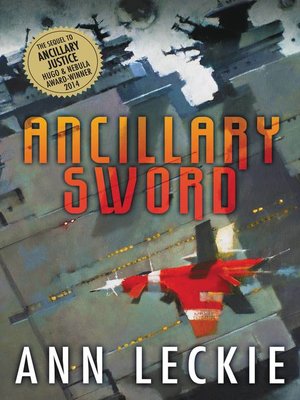 |
| Why have the covers of these books been made so ugly while reflecting nothing of what's inside? |
Ancillary Sword reads as fast as its predecessor, Ancillary Justice. I began reading it about 10 PM on Thursday night, and finished it during Friday night's reading hours. It's accidental that I read this book only hours before the Hugo awards short list was announced.
Some readers have said Ancillary Sword wasn't up to the quality of Ancillary Justice. I don't agree. However, I think I can see why some feel this way. It's like traveling anywhere: you can only see it for the first time once.
Justice educated us into understanding the strangenesses of the world Leckie created. The grammar is used as we currently usually employ English grammar. But it takes time to comprehend the vocabulary in which Sword of Justice is written. It is almost entirely Leckie's usage of gendered nouns and pronouns that creates the strange of Radchaai space and its citizens -- yet the full collective noun, is the non-gendered "human". Since Justice has educated us into seeing and hearing what was initially strange and puzzling, Sword is more immediately accessible to the reader than Justice was. As Sword is more immediately accessible some think it is a bit disappointing.
Justice educated us into understanding the strangenesses of the world Leckie created. The grammar is used as we currently usually employ English grammar. But it takes time to comprehend the vocabulary in which Sword of Justice is written. It is almost entirely Leckie's usage of gendered nouns and pronouns that creates the strange of Radchaai space and its citizens -- yet the full collective noun, is the non-gendered "human". Since Justice has educated us into seeing and hearing what was initially strange and puzzling, Sword is more immediately accessible to the reader than Justice was. As Sword is more immediately accessible some think it is a bit disappointing.
In terms of language driving the narrative, the plot and and dramatizing the narrator-protagonist Breq, even the titles of the books provide another sophisticated and intriguing dimension to the series. In Justice, it was the sword on which we focus, i.e. how the ruler of a planetary empire employs organized military violence and war, to adjudicate the imperium's disputes and conflicts, even, literally within itself. In Sword, it’s about how justice -- legal, political, social – can be employed to counter even Anaander Mianaai's imperial inner conflicts, as well as specific disputes in specific places.
In both books, the outcomes still depend upon how particular minds choose their own employment of violence and law, on behalf of individuals and collective entities. These collective entities are also themselves often individuals, so to speak, contained within a larger collective, such as the captive labor in generational perpetuity labor slavery within the larger collective of the empire, spiraling down through containment within the planetary system, the planet, the tea plantations and the administrations of all of them.
Though the second novel is titled Ancillary Sword, Fleet Commander Breq serves on a Radch imperium Mercy (of Kalr) ship, while being countered by a Sword (of Atagaris) ship, complete with the ancillaries, which Breq's Mercy ship doesn't have. But it is justice, strained through mercy, that Breq must wield, for the survival of her ship and mission, not the sword of military violence.
Ancillary Sword tackles other issues of an imperium's violence as well: colonization, exploitation and slavery, as well as wars of conquest and civil war for control that are not only inevitable to empire, but even, in many ways, an empire's raison d'etre (see: Napoleon's empire, to examine this signature of imperium from fairly close period in our own time, but one distant enough in history that we can see it more clearly than our own).
Leckie give us all this, not only through characters' dilemmas, but with language. She creates an exciting work of fiction that interrogates the boundaries of civic responsibility for individuals whether AI, such Station Administrator Celar, or collective individuals such as the variety of ancillaries, and the variety of levels that make up the whole society of the Atohoek (ad hoc?) planetary system, at this moment, within the Radch imperium. This is an impressive achievement.
Though the second novel is titled Ancillary Sword, Fleet Commander Breq serves on a Radch imperium Mercy (of Kalr) ship, while being countered by a Sword (of Atagaris) ship, complete with the ancillaries, which Breq's Mercy ship doesn't have. But it is justice, strained through mercy, that Breq must wield, for the survival of her ship and mission, not the sword of military violence.
Ancillary Sword tackles other issues of an imperium's violence as well: colonization, exploitation and slavery, as well as wars of conquest and civil war for control that are not only inevitable to empire, but even, in many ways, an empire's raison d'etre (see: Napoleon's empire, to examine this signature of imperium from fairly close period in our own time, but one distant enough in history that we can see it more clearly than our own).
Leckie give us all this, not only through characters' dilemmas, but with language. She creates an exciting work of fiction that interrogates the boundaries of civic responsibility for individuals whether AI, such Station Administrator Celar, or collective individuals such as the variety of ancillaries, and the variety of levels that make up the whole society of the Atohoek (ad hoc?) planetary system, at this moment, within the Radch imperium. This is an impressive achievement.
So far the Ancillary novels are among the most original, most interesting writing achievements that has come out of science fiction in quite a few years.

No comments:
Post a Comment